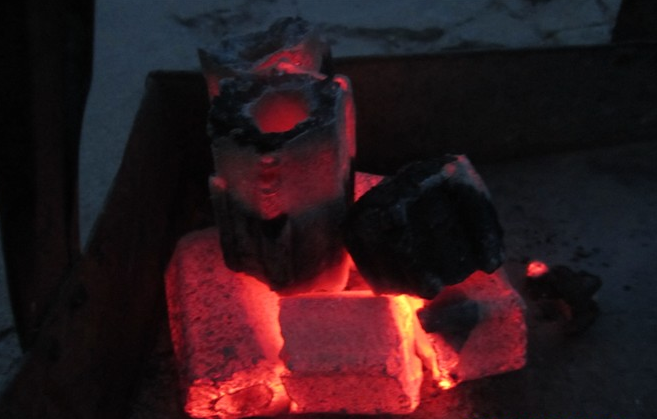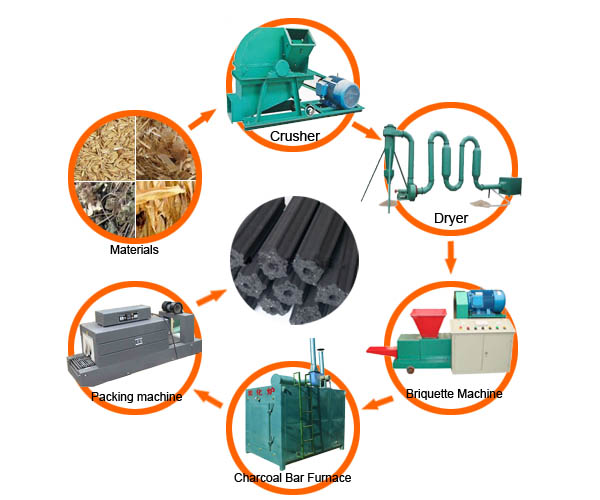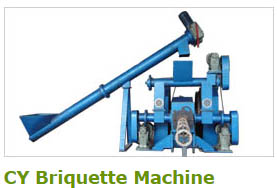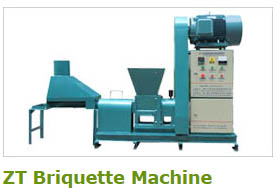Several community based organisations, NGOs and environmental programmes have introduced
in rural East Africa as a way to tackle income poverty alongside environmental conservation and these are increasingly taking an enterprise approach. In addition to this Uganda, Kenya and Tanzania have seen a few large commercial enterprises being set up; interestingly, each with quite different business models adapted for their own context. A selection of these notable businesses and projects are presented here.
Kampala Jellitone Suppliers (KJS) is a limited company located in the Natete suburb of Kampala. With a history in coffee roasting, KJS diversified into making briquettes primarily to fuel their own requirements but expanded into Uganda’s first large-scale briquette producer; now selling 2,400 tonnes per year to 35 institutions including schools, hospitals and factories at Ush 700 (US$0.28) per kg.They remain the only factory in the region producing non-carbonised briquettes from agricultural waste, which they collect from four different districts. The company will pay a higher price for processed feedstock (already milled) and are seeking to supply farmers with milling machines in an attempt to improve transport efficiency. The company has been financed by its founder and grants from the Danish International Development Agency (DANIDA), the United States African Development Foundation and the Ashden Awards. The initial grant from DANIDA helped to buy the first briquette machine, set up production and carry out research into briquetting technology but after that briquetting quickly become a self-sustaining part of the business; with production recently moving to a new, larger factory funded purely by the company’s own income. They currently operate two imported electrically powered piston machines with a combined capacity of 1.25 tonnes per hour (3,500 tonnes per year) as well as an industrial drier for drying feedstock. However these machines do not operate at full capacity, limited by the throughput of the feedstock drying process. KJS conduct their own research in briquette making through the Fuel from Wastes Research Centre, a research NGO set up by the company. They also carry out research in collaboration with the Makerere University in Kampala. KJS have registered their venture as a CDM project in Uganda and with support from the Belgian Embassy are aiming to develop an appropriate methodology for carbon financing.

Chardust Ltd, Nairobi, Kenya
Founded in 1999 and based in Nairobi, Kenya, Chardust is an alternative energy company that manufactures and sells over 2,000 tonnes of carbonised briquettes per year, mainly to poultry
farms, restaurants, hotels and safari camps for space and water heating. These are made from recycled charcoal dust collected from charcoal vendors around Nairobi. They salvage 8 tonnes of this waste per day before processing it into briquettes and distributing within the city limits. The company markets several different products targeted to different market segments. Their standard briquette is sold to urban (household and institutional) charcoal users. They also sell premium briquettes that are made from higher quality charcoal vendors’ waste and packaged in smaller quantities. These have lower ash content and are sold through supermarkets, certified by the Kenya National Bureau of Standards, for the higher-end domestic barbeque market. Standard briquettes sell for US$0.14 per kg, while the premium briquettes sell for US$0.43 per kg (both wholesale prices). Chardust use roller press machines, imported from India as well as mechanical milling machines. While drying is done outdoors in the sun over 2 acres of land, they stock up to 100 tonnes of briquettes at a time to cover demand during the rainy periods when production drops due to slower outdoor drying. The company has experimented with a large down-draft pit kiln for carbonising agricultural waste, but this has thus far been less economical than utilising charcoal waste. They are also trialling an
agglomeration machine that makes higher-quality spherical briquettes. Although consisting of more processing steps, Chardust’s business model competes with regular charcoal mainly due to lower transport costs. This is possible as the production facility is situated within the city, close to both raw materials and the urban markets.
East Africa Briquettes Company, Tanga, Tanzania
The East Africa Briquette Company has factories in Tanga, Northern Serengeti and Ngoronogoro in Tanzania. The briquettes, which are branded “mkaa bora”, are made with an Indian-made roller press fed by carbonised agricultural waste that is bought from people with a ‘cash at the gate’ policy, allowing them to develop a large network of people who provide a continuous supply of raw material. In 2010 the company, with a marketing campaign partly funded by USAID, was selling 60 tonnes of its pillow shaped briquettes per month. The main biomass materials used are coconut husks, cashew nut shells, maize stalks and cobs. In an interview with The Charcoal Project in 2010, owner Nicholas Harrison discussed plans to open up new factories on a franchise model.
Appropriate Rural Technology Institute (ARTI) – ‘Waste to Wealth’ Project, Dar es Salaam, Tanzania
ARTI-TZ have been running their Waste to Wealth briquette programme since 2006 and in 2011 they received funding through the World Bank’s Biomass Energy Initiative for Africa (BEIA) to conduct a pilot project that trains 1800 people in 60 villages in the 4 rural districts surrounding Dar es Salaam. As of December 2011 they had completed this training in two of the districts and are currently working to help these villages commercialise their enterprises. ARTI’s role is centred on developing the value chain. They do this primarily by training farmers to fabricate charcoal kilns with which they can produce char and equipping some with briquetting technology developed by the ARTI technology institute. By linking producers together to form ‘community-based enterprises’ they have been able to create a network for production, community sensitisation and sales. ARTI have also assisted the high-potential enterprises further to access motorised machinery. This is done through an arrangement in which the organisation absorbs the initial capital cost of the machine but reclaims the cost from the producer through a low rate pay-back arrangement. The programme has seen producers sell briquettes for around US$0.25 and making up to a 40% profit. They have reported successes so far and their plan for the remaining part of the pilot programme includes further work to create sales networks through improved branding and marketing. ARTI-TZ also collaborate with a larger commercial partner based in Dar es Salaam, Joint Environmental Techniques (JET), which was originally set up by ARTI-TZ, to provide a buy-back guarantee for any char powder produced by the ARTI recruits. JET then processes the briquettes, packages them and sells them in the urban centres.
Nicholas Harrison--Tanzania
Nicholas Harrison is the driving force behind one new idea: the
East Africa Briquettes Company. Harrison purchased the factory in
Tanga in March 2009 where he now produces the “mkaa bora,” a briquette that burns “longer, hotter, and cheaper” than conventional vegetable charcoal.
The country consumes about one million tons of wood charcoal each year, so the market is huge. And with a deforestation-to-replacement rate of 3-to-1, there is little chance Tanzania will be able to keep pace with the country’s demand for charcoal, especially in the growing capital.
Tanzania may get more attention than other countries because it’s one of the larger Sub-Saharan states facing all the attendant problems associated with a serious biomass energy crunch.
KMEC is one of the earliest and largest biomass briquette press manufacturer that provide our customers with qualified products, competitive biomass briquette price and superior service. We engage in producing, designing and configuration planning of food processing equipment. The products of our company are with stable performance, excellent quality, innovative design and reasonable structure. If you need biomass briquette machine or want to start a briquetting business, please feel free to contact us.
Resource:
GVEP (Global Village Energy Partnership) International
------------------------------------------------------------------------------------------------------------



